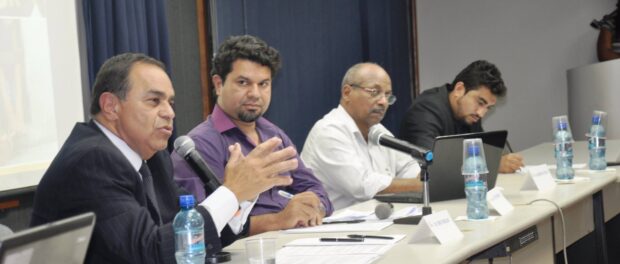
On Monday June 8, the Pontifical Catholic University of Rio de Janeiro (PUC) hosted a panel to discuss the Role of the State in the Criminalization of Poverty From a Human Rights Perspective. Moderated by student Vilde Dorian, the seminar hosted Rio de Janeiro Court of Justice judge Dr. Siro Darlan, former State Secretary of Human Rights and professor at the State University of Rio de Janeiro (UERJ) Dr. Jorge da Silva, and Raull Santiago of Coletivo Papo Reto and addressed a wide variety of issues, such as the genocide of black Brazilians, the reduction of the age of criminal responsibility, Pacifying Police Units (UPPs), and the current justice system and incarceration policy.
Dr. Darlan kicked off the discussion by saying that, since its foundation, colonial Brazil was built on the stigma of inequality and was highly conservative. At the hands of the Portuguese, children were exploited and lacked rights, despite many receiving a Jesuit education. To him, “this process of excluding children from certain benefits and rights continues today… and, whether we like it or not, they are the most vulnerable [members of society].”
He went on to criticize the current push to reduce the age of criminal responsibility. According to him, “we are becoming more barbaric… Reducing the age of criminal responsibility is not the solution. Several countries in Europe tried it and it didn’t work.”
Brazil already holds the fourth largest prison population in the world, and reducing the age of criminal responsibility would only increase the burden. “If you want to see modern day slave quarters, just look at our penitentiary system… 40% of the prison population hasn’t gone to trial. 59% of the [prison] population is between the ages of 18 and 29, and roughly 2/3 is black. It’s clear that our justice system is selective.”
Dr. Jorge da Silva followed, asking the audience to question everything in a Foucaultian manner. He said “we need to individualize ‘the State,’ because that is just an abstraction. Who is the Secretary of State? What are the names of the particular people responsible for a certain issue?” In other words, we need accountability. He later added: “Society should take a look at itself and realize racism is very much real. We can’t dismiss it as ‘an American thing’ when Rio de Janeiro was a major slave port.” He went on to discuss how racism has changed its form, using the United States during the 1970s and 1980s as an example. According to him, “Americans found a shortcut called cocaine and marijuana. They changed the name, but it’s the same thing, and in Brazil they’ve done exactly the same.” He went on to express outrage: “Teachers today are teaching kids what to do during a shootout. What the hell?”
Finally, Raull Santiago opened with an evocative poem he had written especially for the occasion, “Favelas exist in the city, the city exists in favelas.” He mentioned the importance of the event to community media collective Coletivo Papo Reto. He defended: “Why do we use the term favela instead of community…it’s a reappropriation, favela is resistance, favela is urban quilombo.” And went on to say: “I see the favela not just as an example for the rest of the city, but as something that is transforming it, moving it forward.” He discussed issues that affect Complexo do Alemão, such as the shooting of Eduardo de Jesus Ferreira on his doorstep by a policeman. According to him, “stray bullets in favelas don’t exist. The UPPs have created an empty war without objectives, simply losses on both sides… The hate just grows.” He ended his speech by saying: “The blood of the poor is profit.”
After each panel participant spoke, the floor was opened to questions from the audience and the speakers responded in the same order. Dr. Darlan spoke about the need to decriminalize many minor crimes that are used to exclude the undesirable, such as drugs. In discussing the privatization of prisons, he said, “Once you use prison labor for capital gain, you’ve created a modern form of slavery.” Dr. Da Silva questioned the objective of reducing the age of criminal responsibility. According to him, it is social class vengeance. Finally, Santiago concluded the panel by comparing the unfair discrepancies in sentences for a middle class child caught with a large quantity of drugs versus a child from the favela with a minuscule amount of drugs. In his eyes, “The media criminalizes that [favela] kid.”
The event was live tweeted by RioOnWatch. Please check it out via @RioOnWatchLIVE.

